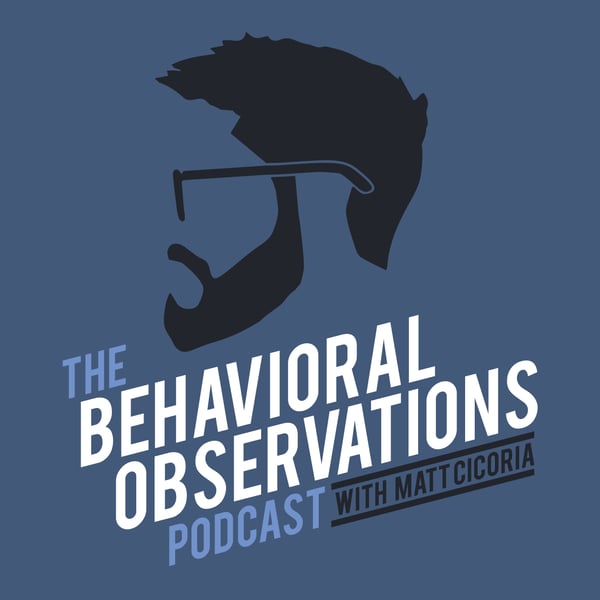Altering the Relative Efficiencies of Responses for Behavioral Improvement: Session 297 with Steve Ward
The Behavioral Observations Podcast with Matt Cicoria
Matt Cicoria
4.8 • 648 Ratings
🗓️ 16 April 2025
⏱️ 57 minutes
🧾️ Download transcript
Summary
Steve Ward returns to the podcast to talk about a paper he recently published with co-author Teresa Grimes, titled, "50 Practical Ways to Alter the Relative Efficiencies of Behaviors."
In this conversation, we review the highlights of this paper, and discuss things like The Matching Law, making desired behavior more efficient in generating reinforcement, making problem behaviors less efficient, and how altering reinforcement parameters like delay, magnitude, and schedules can enhance learner progress.
We also talk about the work that Steve does with his company, Whole Child Consulting, as well as a Q & A he will be doing on this topic that's coming up on April 23rd, 2025.
Steve is the author of Teaching Good Learner Repertoires, What You Need To Know About Motivation And Teaching Games: An In-Depth Analysis, and other popular texts relevant to Behavior Analysts working in a variety of settings.
If you'd like to work with Steve or find supplementary materials on the things he likes to talk about, check out his website, Whole Child Consulting.
Resources discussed in this podcast:
- Ward and Grimes (2025). 50 Practical Ways to Alter the Relative Efficiencies of Behaviors.
- Ward, Parker, and Perdikaris (2016). Task as Reinforcer: a Reactive Alternative to Traditional Forms of Escape Extinction.
- Perone (2003). The Negative Effects of Positive Reinforcement.
- Steve's earlier appearances on the BOP in Session 111 and Session 187.
- Anxiety? ABA has something for that! (Steve's Behavior University webinar, use promo code PODCAST at checkout to save $$$).
Please note that we had some internet disruptions during our recording but I don't think they detracted from the overall intelligibility of the conversation.
This podcast is brought to you by:
- Frontera. Consider taking a demo of Frontera's Assessment Builder and see how the ethical application of AI technologies can help you serve clients and save you time! Your first assessment report is free. And if you use code BOP25 you’ll get an additional five assessments for just $100. So head to fronterahealth.com to check it out!
- CEUs from Behavioral Observations. Learn from your favorite podcast guests while you're commuting, walking the dog, or whatever else you do while listening to podcasts. New events are being added all the time, so check them out here.
- The Behavioral Toolbox. Check out our courses for school-based and other behavioral professionals, including our newest one, Motivational Interviewing: Getting Educator Buy-In.
- Behavior University. Their mission is to provide university quality professional development for the busy Behavior Analyst. Learn about their CEU offerings, including their 8-hour Supervision Course, as well as their RBT offerings over at behavioruniversity.com/observations. Don't forget to use the coupon code, PODCAST to save at checkout!
Transcript
Click on a timestamp to play from that location
| 0:00.0 | Hey, everyone, welcome to session 297 of the behavioral observations podcast. In this episode, |
| 0:05.0 | Steve Ward returns to this show, and he's talking about a paper he recently published with co-author |
| 0:10.8 | Teresa Grimes called 50 Practical Ways to Alter the Relative Efficiencies of Behaviors. In this conversation, |
| 0:18.5 | we review the highlights of this paper and discuss things like the matching |
| 0:22.7 | law. We talk about making desired behavior more efficient in generating reinforcement, |
| 0:27.6 | and conversely, making problem behaviors less efficient. And we also talk about how altering |
| 0:33.0 | reinforcement parameters like delay, magnitude, and their schedules themselves, and how those things |
| 0:39.2 | can enhance learner progress. You talk about the work that Steve does with his company, |
| 0:43.8 | Whole Child Consulting, and he's got a Q&A coming up on April 23rd, 2025. There's a link to that in |
| 0:50.4 | the show notes. Steve is the author of several books, including teaching good |
| 0:54.9 | learner repertoires and what you need to know about motivation and teaching games and in-depth |
| 1:00.9 | analysis. And these texts are, again, very popular and relevant to behavior analysts working |
| 1:07.1 | in a variety of applied settings. If you'd like to work with Steve or find supplementary |
| 1:12.8 | materials on the things he likes to talk about or his books and things like that, we've got |
| 1:18.3 | a link to his website in the show notes for this episode, or you can just Google Whole Child |
| 1:24.2 | consulting and find it there. I should also note that we had a couple of |
| 1:28.2 | internet disruptions during our recording, so there might be a time here or there where we kind |
| 1:31.8 | of drop off, but I don't think it detracted from the intelligibility of the conversation, |
| 1:38.8 | but I do apologize if it does impair the listening experience that you've come to expect |
| 1:43.6 | from the behavioral |
| 1:44.5 | observations podcast. Before we get to the show itself, I want to let you know that we're brought |
| 1:48.6 | to you by Frontera. Consider taking a demo of Frontera's assessment builder and see how |
... |
Please login to see the full transcript.
Disclaimer: The podcast and artwork embedded on this page are from Matt Cicoria, and are the property of its owner and not affiliated with or endorsed by Tapesearch.
Generated transcripts are the property of Matt Cicoria and are distributed freely under the Fair Use doctrine. Transcripts generated by Tapesearch are not guaranteed to be accurate.
Copyright © Tapesearch 2025.

